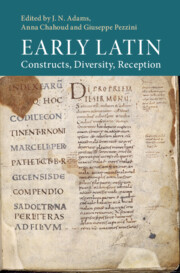Book contents
- Early Latin
- Early Latin
- Copyright page
- Dedication
- Contents
- Illustrations
- Tables
- Contributors
- Acknowledgements
- Abbreviations
- Chapter 1 Introduction: What Is ‘Early Latin’?
- Part I The Epigraphic Material
- Part II Drama
- Part III Other Genres and Fragmentary Authors
- Part IV Reception
- Chapter 20 ‘Early Latin’ and the Fragments of Atellane Comedy
- Chapter 21 Lucretius and ‘Early Latin’
- Chapter 22 Cicero and Early Dramatic Latin
- Chapter 23 Early Latin Texts in Livy
- Chapter 24 Pliny Rewrites Cato
- Chapter 25 Gellius’ Appreciation and Understanding of ‘Early Latin’
- Chapter 26 Views on ‘Early Latin’ in Grammatical Texts
- Chapter 27 Nonius Marcellus and the Shape of ‘Early Latin’
- Chapter 28 ‘Early Latin’ to Neo-Latin
- Chapter 29 Conclusions
- Bibliography
- Index Verborum
- Index of Non-Latin Words
- Index Locorum Potiorum
- Subject Index
Chapter 21 - Lucretius and ‘Early Latin’
from Part IV - Reception
Published online by Cambridge University Press: 27 July 2023
- Early Latin
- Early Latin
- Copyright page
- Dedication
- Contents
- Illustrations
- Tables
- Contributors
- Acknowledgements
- Abbreviations
- Chapter 1 Introduction: What Is ‘Early Latin’?
- Part I The Epigraphic Material
- Part II Drama
- Part III Other Genres and Fragmentary Authors
- Part IV Reception
- Chapter 20 ‘Early Latin’ and the Fragments of Atellane Comedy
- Chapter 21 Lucretius and ‘Early Latin’
- Chapter 22 Cicero and Early Dramatic Latin
- Chapter 23 Early Latin Texts in Livy
- Chapter 24 Pliny Rewrites Cato
- Chapter 25 Gellius’ Appreciation and Understanding of ‘Early Latin’
- Chapter 26 Views on ‘Early Latin’ in Grammatical Texts
- Chapter 27 Nonius Marcellus and the Shape of ‘Early Latin’
- Chapter 28 ‘Early Latin’ to Neo-Latin
- Chapter 29 Conclusions
- Bibliography
- Index Verborum
- Index of Non-Latin Words
- Index Locorum Potiorum
- Subject Index
Summary
This paper is concerned with the presence of early Latin linguistic and stylistic elements in a first-century BC text, Lucretius’ De Rerum Natura. The poem notoriously features a variety of optional archaic forms, such as the terminations -ai for the genitive singular of the first declension, and -ier for the passive infinitive. These are found alongside their more standard equivalents -ae and -i, resulting in a mixed style that combines archaisms and non-archaisms. This study offers 1) a full reconsideration of these optional archaisms, providing richer data on their distribution both in the poem and in the hexameter line, and methodological consideration of ‘metrical convenience’, an explanatory concept which is often invoked when dealing with such forms but rarely explored in detail or depth; and 2) a new analysis of features of vocabulary and phraseology that are shared by Lucretius and early Latin authors. A particular concern will be distinguishing, where possible, between the influence of Latin and Greek: Lucretius’ use of compounds is demonstrably influenced by Empedocles, but also by Ennius; his use of tmesis finds some parallels in Homer, and some in Early Latin.
- Type
- Chapter
- Information
- Early LatinConstructs, Diversity, Reception, pp. 434 - 452Publisher: Cambridge University PressPrint publication year: 2023



